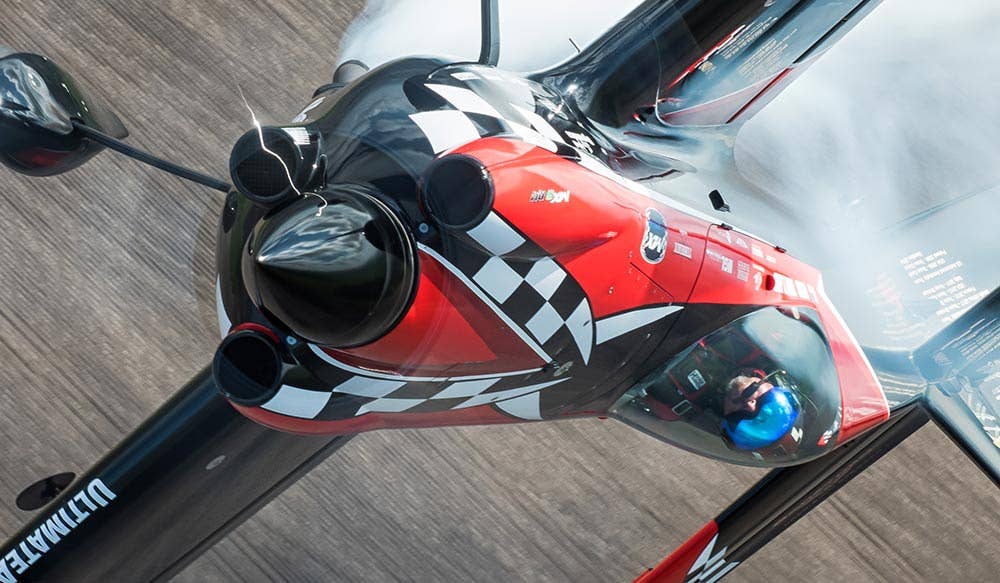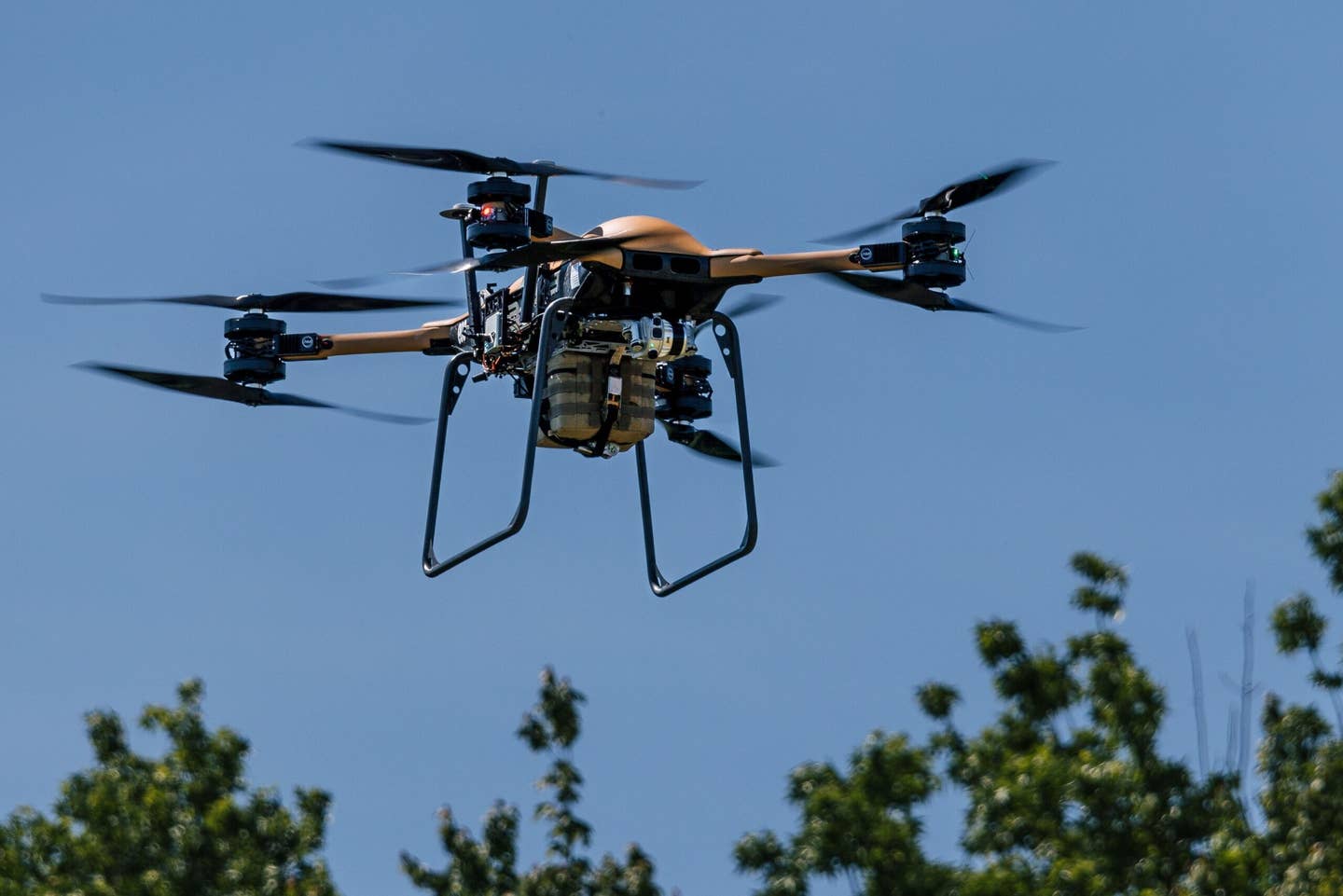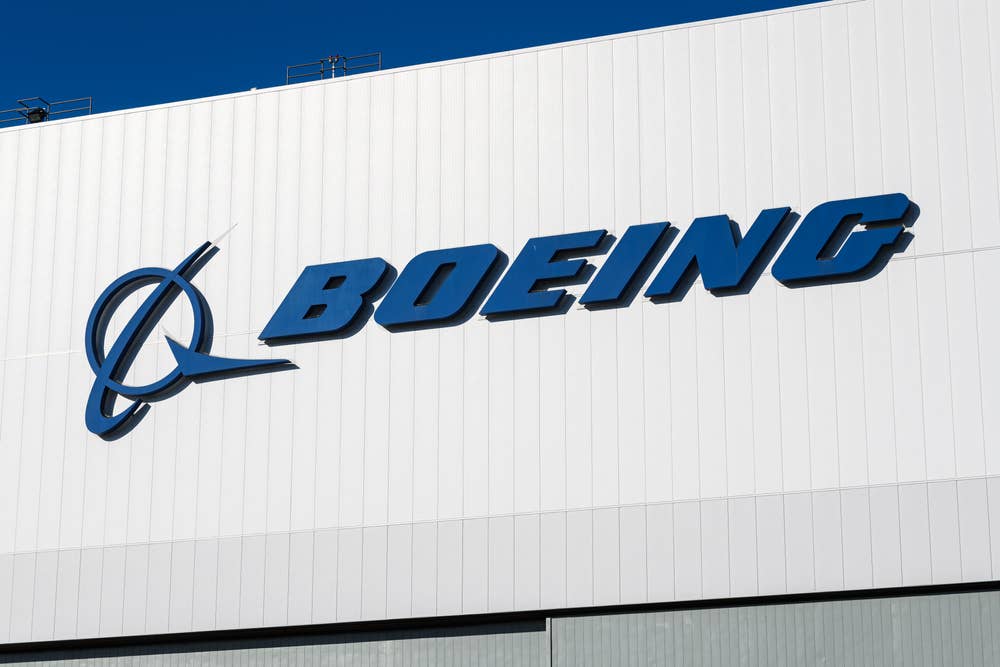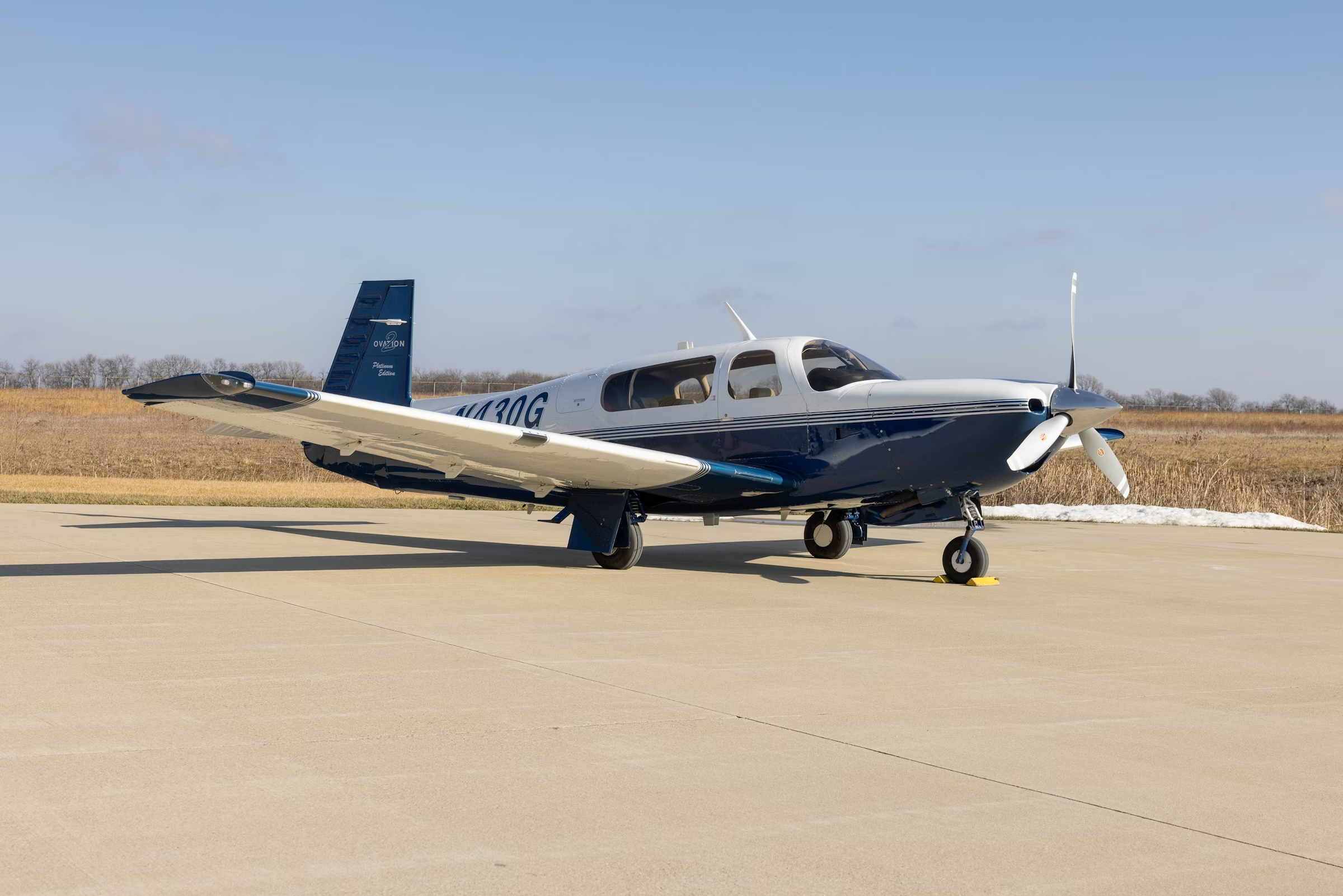EHang Plans Expansion of Electric Air Taxi Services to UAE
The Chinese manufacturer joins Archer, Joby, and other eVTOL firms that have laid plans for operations in the Middle East.
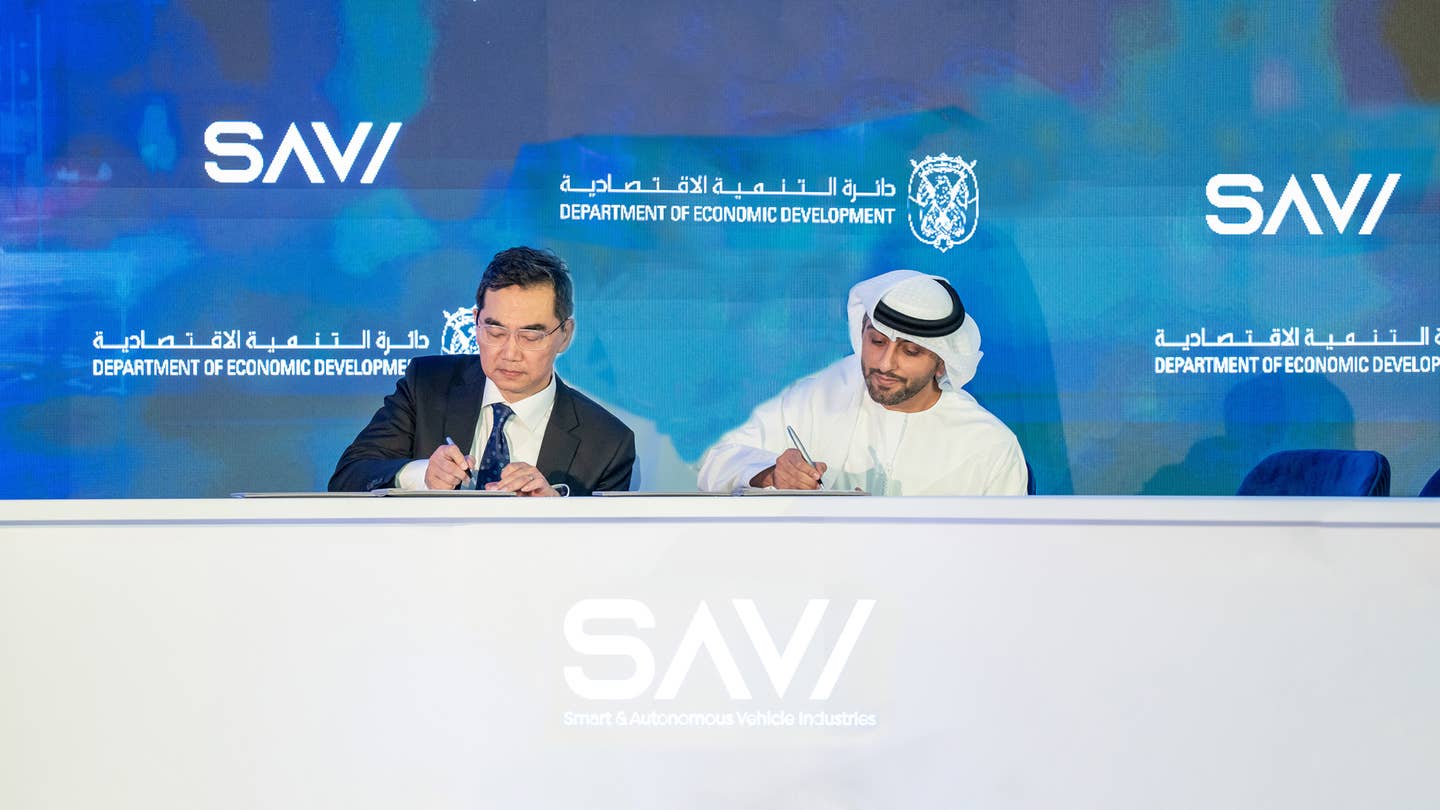
Conor Chia-hung Yang, chief financial officer of EHang (left), and Mohamed Al Dhaheri, Wings Logistics Hub board member, sign a strategic partnership. [Courtesy: EHang]
The world’s first type certified electric vertical takeoff and landing (eVTOL) design is coming to the Middle East.
Chinese manufacturer EHang, which obtained the watershed approval for its EH216-S air taxi in October, intends to expand operations to the United Arab Emirates through a long-term strategic collaboration with Wings Logistics Hub. The partners will work toward local certification and operations for several EH216 series models, and Wings plans to purchase up to 100 aircraft. Deliveries will begin in 2024, EHang said.
Wings is the passenger eVTOL and logistics technology subsidiary of Technology Holding Company (THC), the tech arm of investment management firm EIH Ethmar International Holding. Ethmar is chaired by Sheikh Hamdan bin Mohammed bin Zayed Al Nahyan, one of the sons of Abu Dhabi ruler and UAE President Sheikh Mohamed bin Zayed Al Nahyan, better known as MbZ.
It appears Wings is a relatively new banner for Ethmar and THC, which does not yet list the brand as a subsidiary on its website. The company bills itself as a provider of smart logistics, advanced air mobility (AAM), and smart city solutions, including passenger eVTOL services, vertiports, and urban air mobility (UAM) corridors.
“Introducing electric aviation to the UAE is anticipated to alleviate congestion with zero emissions and, consequently, attract significant foreign direct investment and generate thousands of jobs in the region over the next decade,” said Mohamed Al Dhaheri, a Wings board member and the CEO of THC. “[We] remain steadfast in our commitment to advancing smart and autonomous vehicle technologies for passenger transportation, mobility, logistics, and smart city management in the UAE.”
As part of its expansion, EHang will join the Smart and Autonomous Vehicle Industries (SAVI) Cluster, an urban hub centered in Abu Dhabi’s Masdar City community. SAVI, which launched in October, aims to speed the development of new vehicles across air, land, and sea, and is backed by several Emirati royals. The initiative is led by the Abu Dhabi Investment Office (ADIO), for which Al Dhaheri briefly served as acting executive director.
Earlier this year, a pair of American eVTOL makers—Archer Aviation and Joby Aviation—also joined the SAVI Cluster. Archer plans to set up a new headquarters and engineering facility in the region with an eye toward a 2026 launch, while Joby intends to establish a significant footprint as well. In November, Archer announced the planned sale of 100 air taxis to Air Chateau International, an Emirati private heliport operator, for around $500 million.
In addition, EHang previously announced a partnership with Abu Dhabi’s Department of Economic Development (ADDED) to build a manufacturing plant in the city. The project aims to produce new aircraft, establish a regional command-and-control center, and build infrastructure such as vertiports.
The World’s First Electric Air Taxi
EHang’s expansion news comes just a few months after its self-flying, two-passenger EH216-S achieved type certification from the Civil Aviation Administration of China (CAAC), making it the first manufacturer in the world with such an approval. As things stand, it remains the only firm to reach that milestone.
“For the industry, the first type certificate for an eVTOL aircraft is a major step forward, as it shows that a player has met the expectations around safety, reliability, etc. that the regulator imposes to protect the public,” Robin Riedel, who co-leads McKinsey’s Center for Future Mobility, told FLYING in October.
EHang’s autonomous design is a rarity in the eVTOL air taxi space, with most players choosing to fly with an onboard pilot in the early going. Its EH216-S has a 22 sm (19 nm) range and 80 mph (70 knots) cruise speed, both of which are on the lower side compared to other eVTOL air taxi designs.
The manufacturer’s type certification comes with a few key operational limitations—such as restrictions on routing, scheduling, and flights without visual observers—which it said it will gradually lift over time. As it prepares for customer deliveries, which are expected to begin this year, the company is working to obtain production and airworthiness certificates.
EHang is also developing the heavy-lift EH216-L and the firefighting EH216-F, both of which it intends to certify and deploy in the UAE.
The Middle East has seemingly become an increasingly attractive market for eVTOL manufacturers, in part due to the willingness of leaders to invest in AAM projects and experiment with new technologies for planned smart cities.
In December, the UAE’s General Civil Aviation Authority (GCAA) and the Mohammed bin Rashid Aerospace Hub announced a partnership with vertiport firm VPorts to build a 9-acre AAM integrator center. The hub would support eVTOL flight testing and development and is expected to open next year.
Already, the project has received an initial $40 million investment, and it’s expected to generate nearly $7 billion in revenue for Abu Dhabi and Dubai over the next 25 years.
UAE leaders also published the country’s first national vertiport regulations, and VPorts plans to build the first facility at Ras Al Khaimah International Airport (OMRK) north of Dubai. The city’s crown prince in February approved plans to develop a nationwide vertiport network, working with the U.K.'s Skyports to develop widespread infrastructure by 2026. A concept for a facility at Dubai International Airport (OMDB) was unveiled in April.
In addition to Archer and Joby, another U.S. firm, Odys Aviation, hatched plans for service in the UAE in May. Embraer subsidiary Eve Air Mobility, based in Brazil, also intends to launch passenger eVTOL flights in Dubai by 2026. Eve has a preorder for 35 air taxis from Emirati operator Falcon Aviation, which is working with Archer.
EHang’s main competitor in China, AutoFlight, is also partnered with Falcon to bring its Prosperity eVTOL to the Middle East. Germany’s Lilium, meanwhile, picked up an order for 10 Pioneer Edition Jets from Dubai’s ArcosJet, which it announced as its exclusive dealer for private sales in the UAE, Israel, and Cyprus.
EHang is also targeting operations in Europe. In November, it announced plans to build a first-of-its-kind European UAM Center at Spain’s Lleida-Alguaire International Airport (LEDA). The center aims to prepare mainland Europe for UAM services by collecting data on early operations, which will be used to integrate eVTOL services with airport infrastructure, air traffic management systems, and other technologies.
Before flying in the Middle East or Europe, however, EHang will first need to wait for authorities to establish a process for mutual regulation of its CAAC approvals. Depending on the country and regulator, operational restrictions could be added or removed. But cementing the initial type certification should help EHang give authorities an idea of what early operations will entail.
Like this story? We think you'll also like the Future of FLYING newsletter sent every Thursday afternoon. Sign up now.

Sign-up for newsletters & special offers!
Get the latest FLYING stories & special offers delivered directly to your inbox

